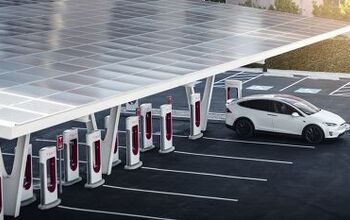NYT to Pelosi and Reid: Hang Tough on CAFE
The New York Times has issued a stern warning to House Speaker Nancy Pelosi and Senate Leader Harry Reid not to accept a smaller hike in federal Corporate Average Fuel Economy (CAFE) standards. In an editorial entitled "Where's the energy bill?" (the word "frickin'" didn't make the cut), the Old Gray Lady asserts that "The single most effective way to address the problem of oil imports and consumption is to improve the efficiency of cars and light trucks, which use more than two-thirds of all the oil burned in the United States." After that failure of imagination, the piece hits Congress with both barrels. "Efficiency standards have changed little in 30 years. The Senate bill mandates an ambitious 40 percent improvement by 2020. The House ducked the issue — but Ms. Pelosi promised to fight for stronger standards in later negotiations. She must now honor that pledge." Or what? The Day After Tomorrow? Anyway, if you're a free marketeer with an anger management problem, you might want to give the link a miss.
More by Robert Farago


































Comments
Join the conversation
Gotta give credit where it's due - Friedman is almost dead on in his column. If the US accounted for 100% of oil consumption, he would be right - you could probably put a $1 tax on gasoline, and prices wouldn't change much at all - the shape of the supply and demand curves at these prices are virtually inelastic. However, as it stands, the US only accounts for something like ~30% of oil consumption, so a gas tax is not the free lunch Friedman implies - a gas tax will definitely raise prices at the pump. But in any case, a gas tax is still a good idea. Bravo Friedman - this time.
"Anyway, if you're a free marketeer with an anger management problem, you might want to give the link a miss." Ho Ho Ho! I resemble that remark! I took your advice, too. My wife made the mistake of signing us up for the old grey rag a while back. I was miserable for several weekends until she canceled it. I could NOT stop ranting after reading their front page [s]editorials[/s] news stories. So, since I didn't read any of the links, I can save us all a rant by putting out a few bullet remarks: Once again, Friedman is an idiot, ignore him. There are no regressive taxes today unless you change the meaning of regressive to "means indifferent". Progressive taxes are seriously holding back our economy, and killing jobs creation. The modern definition of "fair" is Orwellian.
To be fair to Friedman, he did not argue in his column that gas prices at the pump would not go up. He only argued that a portion of the tax would be offset by falling prices -- not the whole thing. In fact, some increase in prices would have to take place if the scenario is to remain coherent. Pre-tax oil prices are to go down because consumption goes down after a tax is imposed, and the only reason consumption goes down after a tax is that after-tax gasoline prices are higher. If pre-tax oil prices went down so much as to completely swallow up the tax, then pump prices would remain low and people would buy SUVs and not consume less, which cannot happen if pre-tax prices are to go down. The devil is in the details. While short-term demand elasticity for gasoline is slight (i.e. demand is largely inelastic over short spans), medium and long term trends should reveal greater elasticities. As the average lifespan of a car in the American fleet is around ten years, that is, in many respects, a key time horizon. If a substantial (phased-in) tax hike is announced on day 1, it will only be ten years later that the fleet will, by and large, consist of (more efficient) vehicles purchased after news of the price hike sunk in, and the full decrease in consumption felt. If things like car-dependent urban planning are added to the mix, the time horizon is longer, as American housing stock and land-use patterns tend to have multi-decade lifespans. There are behavioral imponderables -- would higher gas prices lead to more carpooling, ride-sharing, and discipline in planning errands and trips? Those changes could happen relatively quickly. Will people compensate by cutting spending elsewhere, and continue to consume just as much gas?